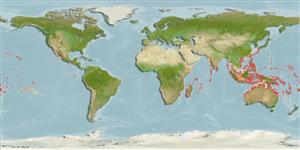Common names from other countries
Environment: milieu / climate zone / depth range / distribution range
Ecología
marino asociado a arrecife; rango de profundidad 0 - 30 m (Ref. 9710). Tropical; 32°N - 35°S, 24°E - 89°W
Indo-Pacific and Eastern Pacific: East Africa to the Mexico, north to southern Japan and the Hawaiian Islands, south to New Caledonia and the Tuamoto Islands. The subspecies Ostracion meleagris camurum is found in the Hawaiian Islands and Ostracion meleagris clippertonense in the Eastern Pacific. Species replaced by Ostracion cyanurus in Red Sea and Gulf of Aden.
Tamaño / Peso / Age
Maturity: Lm ? range ? - ? cm
Max length : 25.0 cm TL macho / no sexado; (Ref. 3141)
Short description
Claves de identificación | Morfología | Morfometría
Espinas dorsales (total) : 0; Radios blandos dorsales (total) : 9; Espinas anales: 0; Radios blandos anales: 9. Juveniles and females brown or green with white spots; large males with orange bands and spots on side of body (Ref. 3141). Caudal fin rays 10 (Ref. 3141). Sexually dimorphic (Ref. 37816).
Inhabits clear lagoon and seaward reefs from the lower surge zone to at least 30 meters (Ref. 37816, 48637). Juveniles among rocky boulders, often with long spined urchins, and adults on reef crests and slopes. Males swim about more openly than females that are often in close vicinity to the males (Ref. 48637). Solitary. Feeds on didemnid tunicates, polychaetes, sponges, mollusks, copepods, and algae (Ref. 37816). Minimum depth reported taken from Ref. 128797.
Life cycle and mating behavior
Maturities | Reproducción | Spawnings | Egg(s) | Fecundities | Larva
Myers, R.F., 1991. Micronesian reef fishes. Second Ed. Coral Graphics, Barrigada, Guam. 298 p. (Ref. 1602)
IUCN Red List Status (Ref. 130435)
CITES (Ref. 128078)
Not Evaluated
Threat to humans
Venomous
Human uses
Pesquerías: pesquerías de subsistencia; Acuario: Comercial
Herramientas
Special reports
Download XML
Fuentes de Internet
Estimates based on models
Preferred temperature (Ref.
115969): 24.6 - 29.3, mean 28.4 (based on 3107 cells).
Phylogenetic diversity index (Ref.
82804): PD
50 = 0.5039 [Uniqueness, from 0.5 = low to 2.0 = high].
Bayesian length-weight: a=0.03548 (0.01700 - 0.07404), b=2.81 (2.62 - 3.00), in cm Total Length, based on LWR estimates for this (Sub)family-body shape (Ref.
93245).
Nivel trófico (Ref.
69278): 2.7 ±0.00 se; based on food items.
Resiliencia (Ref.
120179): Alto, población duplicada en un tiempo mínimo inferior a 15 meses (Fec assumed to be > 10,000).
Fishing Vulnerability (Ref.
59153): Low vulnerability (15 of 100).
